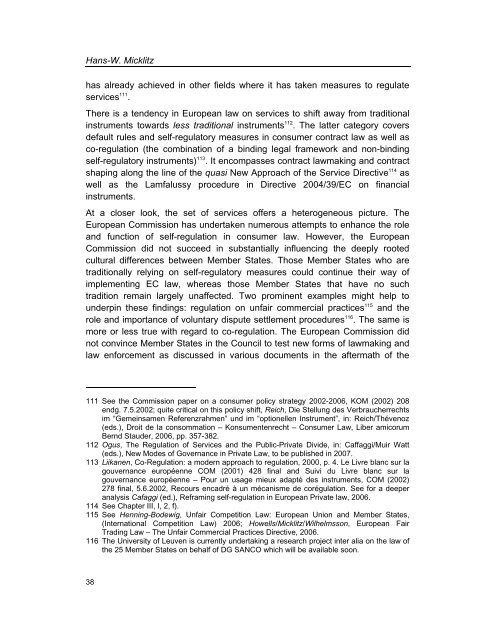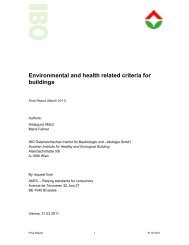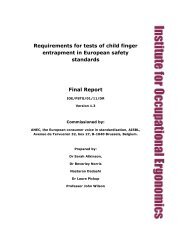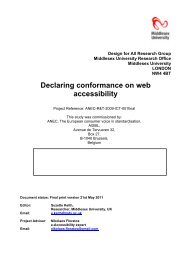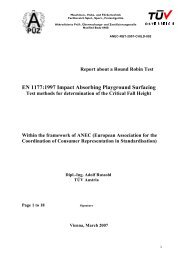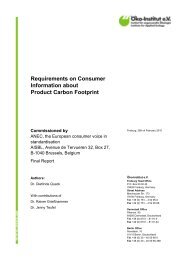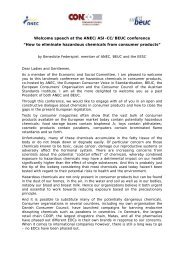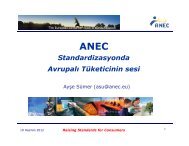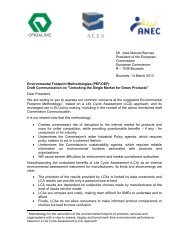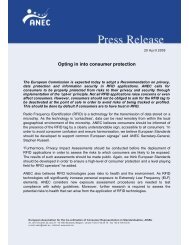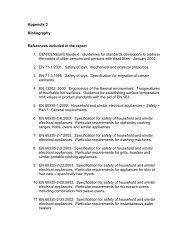Services Standards: Defining the Core Consumer Elements ... - ANEC
Services Standards: Defining the Core Consumer Elements ... - ANEC
Services Standards: Defining the Core Consumer Elements ... - ANEC
You also want an ePaper? Increase the reach of your titles
YUMPU automatically turns print PDFs into web optimized ePapers that Google loves.
Hans-W. Micklitz<br />
has already achieved in o<strong>the</strong>r fields where it has taken measures to regulate<br />
services 111 .<br />
There is a tendency in European law on services to shift away from traditional<br />
instruments towards less traditional instruments 112 . The latter category covers<br />
default rules and self-regulatory measures in consumer contract law as well as<br />
co-regulation (<strong>the</strong> combination of a binding legal framework and non-binding<br />
self-regulatory instruments) 113 . It encompasses contract lawmaking and contract<br />
shaping along <strong>the</strong> line of <strong>the</strong> quasi New Approach of <strong>the</strong> Service Directive 114 as<br />
well as <strong>the</strong> Lamfalussy procedure in Directive 2004/39/EC on financial<br />
instruments.<br />
At a closer look, <strong>the</strong> set of services offers a heterogeneous picture. The<br />
European Commission has undertaken numerous attempts to enhance <strong>the</strong> role<br />
and function of self-regulation in consumer law. However, <strong>the</strong> European<br />
Commission did not succeed in substantially influencing <strong>the</strong> deeply rooted<br />
cultural differences between Member States. Those Member States who are<br />
traditionally relying on self-regulatory measures could continue <strong>the</strong>ir way of<br />
implementing EC law, whereas those Member States that have no such<br />
tradition remain largely unaffected. Two prominent examples might help to<br />
underpin <strong>the</strong>se findings: regulation on unfair commercial practices 115 and <strong>the</strong><br />
role and importance of voluntary dispute settlement procedures 116 . The same is<br />
more or less true with regard to co-regulation. The European Commission did<br />
not convince Member States in <strong>the</strong> Council to test new forms of lawmaking and<br />
law enforcement as discussed in various documents in <strong>the</strong> aftermath of <strong>the</strong><br />
111 See <strong>the</strong> Commission paper on a consumer policy strategy 2002-2006, KOM (2002) 208<br />
endg. 7.5.2002; quite critical on this policy shift, Reich, Die Stellung des Verbraucherrechts<br />
im “Gemeinsamen Referenzrahmen” und im “optionellen Instrument”, in: Reich/Thévenoz<br />
(eds.), Droit de la consommation – Konsumentenrecht – <strong>Consumer</strong> Law, Liber amicorum<br />
Bernd Stauder, 2006, pp. 357-382.<br />
112 Ogus, The Regulation of <strong>Services</strong> and <strong>the</strong> Public-Private Divide, in: Caffaggi/Muir Watt<br />
(eds.), New Modes of Governance in Private Law, to be published in 2007.<br />
113 Liikanen, Co-Regulation: a modern approach to regulation, 2000, p. 4. Le Livre blanc sur la<br />
gouvernance européenne COM (2001) 428 final and Suivi du Livre blanc sur la<br />
gouvernance européenne – Pour un usage mieux adapté des instruments, COM (2002)<br />
278 final, 5.6.2002, Recours encadré à un mécanisme de corégulation. See for a deeper<br />
analysis Cafaggi (ed.), Reframing self-regulation in European Private law, 2006.<br />
114 See Chapter III, I, 2, f).<br />
115 See Henning-Bodewig, Unfair Competition Law: European Union and Member States,<br />
(International Competition Law) 2006; Howells/Micklitz/Wilhelmsson, European Fair<br />
Trading Law – The Unfair Commercial Practices Directive, 2006.<br />
116 The University of Leuven is currently undertaking a research project inter alia on <strong>the</strong> law of<br />
<strong>the</strong> 25 Member States on behalf of DG SANCO which will be available soon.<br />
38


